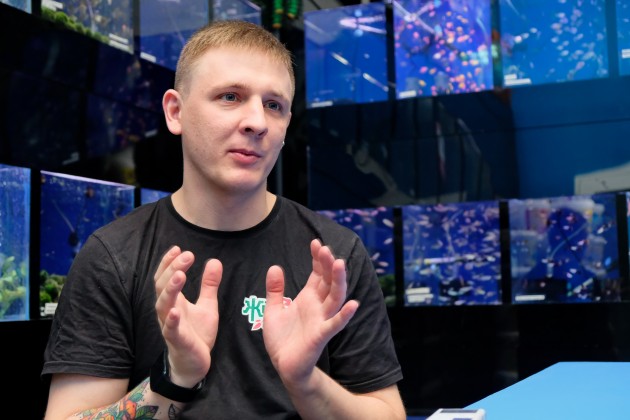ASTANA – The market for professional aquarists is expanding in Almaty, as their services are in great demand. The experts not only preserve life in aquariums, but help those who enjoy the underwater worlds. Large pet stores also hire such specialists.
“This is a very serious profession. It’s a pity that universities do not teach such specialists. The aquarium at home or in an office is a part of nature and it needs to be properly organised – water flow, good filtration, right balance of bacteria and microflora. You cannot even pour water into an aquarium from a tap. The fish need not only feed, but also treatment, adaptation after transportation and many other things,” said professional aquarist Alexander Stroganov, reported Kapital.kz.
He noted Kazakh aquarists are self-taught amateurs who are interested in the business. They are usually trained by more experienced aquarists, then use the Internet and textbooks.
“There is a widespread belief that fish have a memory of only three seconds, but you can’t say this about all of them. Many fish understand you very well. For example, some species of fish recognise their owner – they know who feeds them,” he noted.
“If a stranger enters the room, they will not show any emotion. But if they see the owner, they immediately begin to indulge – they swim up, play, will attract his attention and play with him,” he added.
Many companies are interested in the services of professional aquarists.
“I create a design. I choose the colour of the soil – dark or light. Fish can live in an empty aquarium, so we start from the tastes of the client. Sometimes the soil which makes the water is hard or soft. It is a nourishing soil for living plants,” said Stroganov.
“If a client wants to plant more exotic plants in an aquarium, then another system of care is needed there – you need to supply carbon dioxide and add nutrients and micro and macro elements every day. The more exotic plants and fish, the harder it is to care for them,” he noted.
Fish are not the only aquarium inhabitants, as some also accommodate snails.
“Among them there are useful types; now, in our market there is a useful snail eating algae that appear on plants. Plants in the aquarium and algae are not the same thing. Algae attack the plants and appear in the form of plaque on the leaves and trunks,” said Stroganov.
Owners may spend as little as 30,000 tenge (US$79) for a good aquarium. The investment provides the client with an aquarium made in Germany with very good glass and a cleaner. Stroganov then adds pebbles, a beautiful plant, fish and nutritious food.
“My most expensive aquarium cost one million tenge (US$2,630). It was large with expensive gregarious fish and the aravana (an Asian fish, very much appreciated in China),” he noted.


